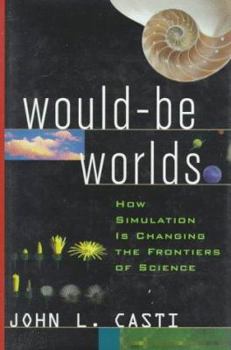Would-Be Worlds: How Simulation Is Changing the Frontiers of Science
Select Format
Select Condition 
Book Overview
Critical acclaim for How Simulation Is Changing the Frontiers of Science "John Casti is one of the great science writers of the 1990s." --San Francisco Examiner. "A popular account of the enormous... This description may be from another edition of this product.
Format:Hardcover
Language:English
ISBN:0471123080
ISBN13:9780471123088
Release Date:September 1996
Publisher:Wiley
Length:264 Pages
Weight:1.25 lbs.
Dimensions:1.0" x 6.5" x 9.6"
Customer Reviews
2 ratings
A book with a good question!
Published by Thriftbooks.com User , 22 years ago
This is one of those books that address important questions. But unfortunately it is not always possible to answer these important questions. This book is about "would-be-worlds", on computer simulations of real life phenomena. The question is how can one explain real world facts with such simulations that look extremely distant from the real world. Good question, but it is very hard to answer. Casti does not answer this question, he has attempts, for example the section "Models for All Occasions" is a good step, but he can not deliver the good. Why? Maybe because he spends a lot of space introducing and discussing various examples of simulations. Maybe because he did not want to play the "philosopher of science" in this book. I do not know, but most probably he thinks that these computational models, and simulations are useful anyway. So he does not tell us how we can trust these models, but he tries to amaze us with these models. But is that bad? No!Although practical and philosophical questions about computer simulations are very important there are still few people thinking about these issues. Casti's book directs attention to these issues and questions. Moreover, this is a book for the layman! Thus, it is good to introduce different sorts of would-be-worlds. Casti is excellent in introducing things!Briefly, although Casti does not tell how it is possible to make inferences about the real world from such artificial worlds, this is a good book to start thinking about the philosophy and methodology of explaining with computer simulations.
Useful non-technical treatment of modelling & simulation
Published by Thriftbooks.com User , 27 years ago
Casti is a lucid and entertaining writer and has sufficient depth in his own subject and breadth in other disciplines as to be well placed to write a book on modelling and simulation. This is an excellent introduction to some of the mathematical, logical, and philosophical problems of and raised by the increasing use of simulation to investigate 'real-world' problems. It assumes no background beyond a general interest in science. If this book has weaknesses they tend to be of the variety that afflicts much modern writing in popular science. Editors rather than authors, perhaps? A sizeable portion of the plates and diagrams add nothing to the book ("gee, John, this is a popular science book - we gotta have some pictures") plus a preference for rushing to mine the next source of the 'gee-whiz' factor rather than grappling with consequences. The strapline on the cover is 'how simulation is changing the frontiers of science' and I'm not at all sure that this question is answered. The last chapter makes an unconvincing attempt to be a summary, but is in fact the least interesting of the five trailing off rather weakly into a 'what we really need is a theory of complex systems' position. But, the acid test - did I learn anything from this book? Most definitely, yes. - Ashley Oliver





